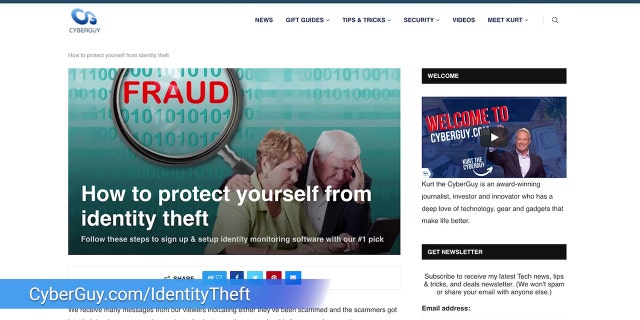
Identity theft has become so commonplace that it no longer shocks you to hear about the latest scam. As normalized as identity theft has become, identity thieves are getting savvier and more creative as consumers and entities they target become more aware and guarded against their attacks.
CLICK FOR KURT’S BEST IDENTITY THEFT PROTECTION PICKS AND SIGN UP FOR HIS FREE CYBERGUY NEWSLETTER WITH QUICK TIPS, TECH REVIEWS, SECURITY ALERTS AND EASY HOW-TO’S TO MAKE YOU SMARTER
When thinking of identity theft, most people think of having their personal information stolen during a data breach. However, there is, unfortunately, a slew of different types of identity theft that can impact you or your loved ones.
What are the different types of identity theft?
While most thefts of your personal information are done digitally, there are several types of identity thefts that are used in real life that really can impact you more than just financially. Below is a breakdown of how your stolen information can be used online or offline.
Criminal Identity Theft Scam

Identity theft has become so commonplace that it no longer shocks you to hear about the latest scam. (Cyberguy.com)
HOW TO PROTECT YOURSELF AGAINST IDENTITY THEFT THIS TAX SEASON
While all identity theft is a crime, criminal identity theft is specifically when a criminal uses your stolen information in dealing with law enforcement. With your stolen information from either online or by mail, these criminals provide your information when getting pulled over by law enforcement or when dealing with the legal system. They may even plead guilty to certain crimes using your identifying information. This way, they can not show up to court dates or pay fines, which leaves you with records, fines, or warrants.
Because your financials aren’t necessarily impacted immediately, most victims of this type of theft don’t find out until they run what they think is a simple background check for a job or purchase. Or worse, when you’re surprised by being served court documents or a simple pull-over by a cop for a minor traffic violation turns into an arrest.
Business Impersonation Scam

Identity theft has become so commonplace that it no longer shocks you to hear about the latest scam. (Cyberguy.com)
It seems unlikely in this day and age when people seem so hyper-aware of identity theft crimes, yet criminals still have success using people, voicemail systems, or bots to call individuals posing as a representative of a company or organization (banks or hospitals) to get personal information or money.
Email Identity Theft Scam

As normalized as identity theft has become, identity thieves are getting savvier and more creative as consumers and entities they target become more aware and guarded against their attacks. (Cyberguy.com)
Though different types of email identity theft tactics have been covered in The ‘Unsubscribe’ email scam is targeting Americans & Microsoft phishing scam & Don’t click that email — lately, the most common forms of email identity theft revolve around posing as people in your life such as friends, families, or colleagues to extract personal information or money.
Most recently, a hacker got ahold of a friend’s email account and replied to an email I had sent her. While they kept her name the same, the email was the hacker’s. Because it was a reply to an old email, it would be easier to mistake it for something sent from my friend. The grammatical error struck me as off, and I checked to see what the email address (I right-clicked) was behind the name of the sender. It turned out to be from an email address I had never heard of.
Other tactics include emails from someone posing as a governmental institution, like the postal service requesting payment in exchange for the package they are holding on your behalf.
STAY ALERT: ‘SEXTORTION SCAMS ON THE RISE 8-FOLD ACCORDING TO FTC
Formjacking Scam

As normalized as identity theft has become, identity thieves are getting savvier and more creative as consumers and entities they target become more aware and guarded against their attacks. (Cyberguy.com)
BIDENCASH CRIMINAL MARKET RELEASES OVER 2M CREDIT CARD NUMBERS FREE FOR TAKING
Formjacking is when cybercriminals hack a website and embed malicious Javascript code, which hijacks the function of the forms on the site to collect user information. This type of theft is usually intended to steal payment information as well as personal information often used at checkout.
Social Media Scam

Identity theft has become so commonplace that it no longer shocks you to hear about the latest scam. (Cyberguy.com)
Scarily enough, you increase your risk of fraud by 30% if you are digitally connected (usually on 5 or more social media platforms). Generally, your information is readily available, as well as the people you are connected to. By piecing together information from a variety of platforms, cybercriminals can create similar profiles to impersonate you and get more information about you or from those who are connected to you.
Buy Now, Pay Later Scam
With installment plan options online, it allows consumers to get items immediately with a plan to pay in installments later. Criminals can gain access to your account to make unauthorized purchases or use your information to create a new account.
Medical Identity Theft Scam

Identity theft has become so commonplace that it no longer shocks you to hear about the latest scam. (Cyberguy.com)
BIDEN ADMIN ROLLS OUT CYBERSECURITY STRATEGY AIMED THWARTING ‘BORDERLESS’ CYBER THREATS, RANSOMWARE
When discussing identity theft, many people consider the immediate financial impact, yet there is a different type of identity theft that is becoming more and more popular.
According to AARP’s coverage of an FTC report, there has been a jump in cases of medical identity theft reported from 6,800 in 2017 to 43,000 in 2021. As many medical institutions sometimes only require a date of birth to proceed with making appointments, it makes it easier to begin fraudulent activities.
The financial implications alone can be bad as medical debt collections which can impact your credit or keep you in debt for services you didn’t even render. Phony services, prescription purchases, or medical issues by criminals using your information means that their health history can become a part of your record. This can impact future medical care you can receive, as well as insurance benefits.
Synthetic Identity Theft Scam

As normalized as identity theft has become, identity thieves are getting savvier and more creative as consumers and entities they target become more aware and guarded against their attacks. (Cyberguy.com)
Sometimes criminals use some of your personal information and/or their own to open new credit cards or take out loans. For instance, they might use your social security number and birth date with a fake name.
Child Identity Fraud Scam
If it isn’t enough to scam an adult, criminals are stooping to a new low by stealing the personal information of children to make unauthorized purchases or open accounts. Because children are not often actively monitoring their information as they aren’t filing taxes or opening accounts, most fraudulent activities go unnoticed for years.
I’ve been scammed! What to do next?
Below are some next steps if you find you or your loved one is a victim of identity theft.
CLICK HERE TO GET THE FOX NEWS APP
- If you can regain control of your accounts, change your passwords and inform the account provider
- Look through bank statements and checking account transactions to see where outlier activity started
- Use a Fraud protection service: Identity Theft companies can monitor personal information like your Social Security Number (SSN), phone number and email address and alert you if it is being sold on the dark web or being used to open an account. They can also assist you in freezing your bank and credit card accounts to prevent further unauthorized use by criminals. Some of the best parts of using an identity theft protection service like my #1 pick include identity theft insurance to cover losses and legal fees, and a white glove fraud resolution team where a US-based case manager helps you recover any losses. Learn more by heading to cyberguy.com/identitytheft.

Protect yourself from identity theft (Cyberguy.com)
- Report any breaches to official government agencies like the Federal Trade Commission
- Get the professional advice of a lawyer
before speaking to law enforcement, especially when you are dealing with criminal identity theft
if being a victim of criminal identity theft leaves you unable to secure employment or housing - before speaking to law enforcement, especially when you are dealing with criminal identity theft
- if being a victim of criminal identity theft leaves you unable to secure employment or housing
- Alert all three major credit bureaus and possibly place a fraud alert on your credit report
- Run your own background check or request a copy of one if that is how you discovered your information has been used by a criminal.
If you are a victim of identity theft, the most important thing to do is to take immediate action to mitigate the damage and prevent further harm.
Have you been the victim of identity theft? Let us know what happened and how you dealt with it. We want to hear from you.
For more of my tips, subscribe to my free CyberGuy Report Newsletter by clicking the “Free newsletter” link at the top of my website.
Copyright 2023 CyberGuy.com. All rights reserved.

 Latest Breaking News Online News Portal
Latest Breaking News Online News Portal




